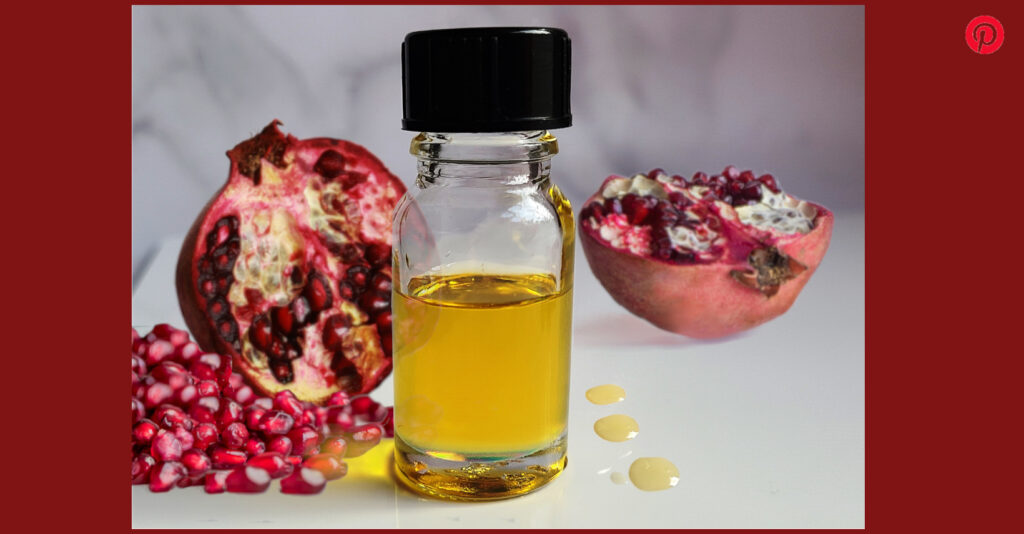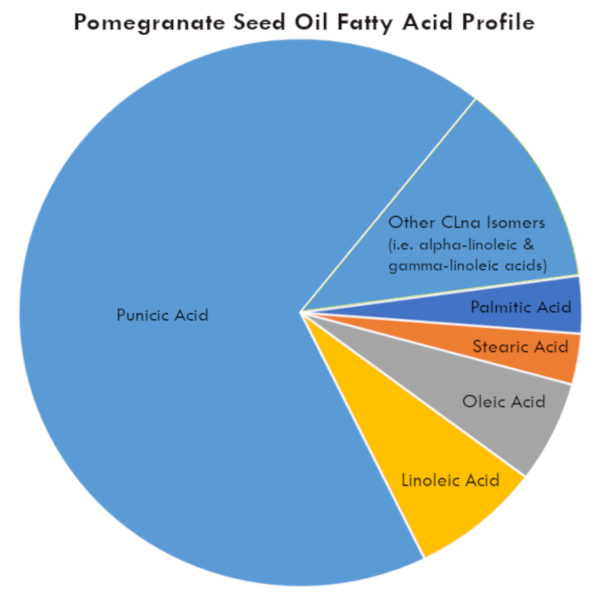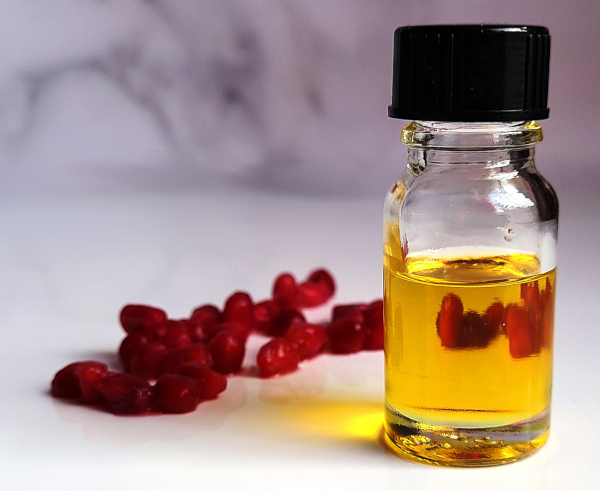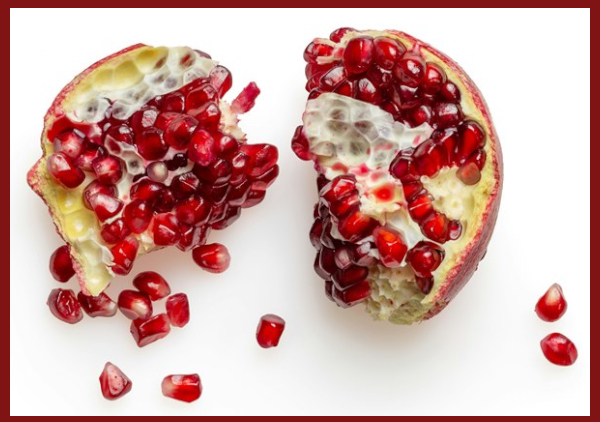
Pomegranate Seed Oil: My Favorite Carrier Oil for Itchy Skin and Face Eczema
I get itchy easily. It used to be the only relief I got from my itchy skin was by scratching it. But that led to skin irritation and broken skin, especially during an eczema flare-up. And you know what? The relief was only temporary and then I’d be itchy again! And not only that, I found that scratching made me distressed and increased my anxiety which lead to more itchiness. Then I discovered Pomegranate Seed Oil.

[This post contains affiliate links. If you make a purchase through one of these links I may earn a commission. This does not impact your price. For more information, please see our disclosure.]
In this Post
About the Pomegranate
The Pomegranate is unique in a lot of ways. First off, it’s a very small genus consisting of just two species!
One species, known as Socotran Pomegranate (Punica protopunica), is one of the many plant species endemic to the Island of Socotra (Yemen) in the Indian Ocean. The Socortan Pomegranate is considered the precursor to the Pomegranate, hence the protopunica moniker.
The other species we are all familiar with! It’s Punica granatum. This pomegranate gives us deliciously sweet-tart, antioxidant-rich arils and deep red juice, and a skin-nourishing pomegranate seed carrier oil! It has a long history of use as a source of food and medicine.
The pomegranate symbolizes life, longevity, health, fecundity, knowledge, morality, immorality, spirituality, and divinity.
J. Shutes & S. Siegmund-Roach, The Carrier Oil Palette (2022)
Pomegranate: A Super Fruit
Because of its myriad health benefits, pomegranate is considered one of the “Super Fruits.” The fruit/juice of the pomegranate:
- is rich in antioxidants
- has anti-inflammatory properties
- supports healthy cognitive function
- supports general wellness through all systems
- promotes increased endurance
- can improve oral health.
Pomegranate seed oil benefits to the skin include:
- superior anti-inflammatory
- rich in polyphenol, phytosterol, and flavonoid antioxidants
- rebuilds collagen in the skin
- improves skin elasticity
- encourages cell regeneration
- penetrates deeply into the skin
- supports a healthy skin barrier
- highly nourishing to dry, itchy skin conditions
- excellent in body, face, and lip oil formulations
- my favorite lipid carrier oil for face eczema!
Pomegranate Seed Oil Fatty Acids: Amazing Punicic Acid
Like other carrier oils, pomegranate seed oil contains the common fatty acids:
- Linoleic Acid (6.4-8.4%)
- Oleic Acid (5.7-6.4%)
- Stearic Acid (1.3-3.3%)
- Palmitic Acid (3.2-3.5%)
But what makes pomegranate seed oil’s fatty acid profile so impressive is the percentage of conjugated linoleic acids (CLnA). These are a group of long-chain fatty acids (they have 18 carbons) known for their anti-inflammatory properties.
Conjugated linoleic acids (in lighter blue on the pie chart) include gamma-linoleic acid (GLA), alpha-linoleic acid (an essential fatty acid), and the fatty acid unique to pomegranate: Punicic Acid.
We can see by the pie chart that conjugated acids comprise an overwhelming percentage of the fatty acids in pomegranate seed oil. Punicic acid alone makes up 57-79% of pomegranate seed oil’s fatty acid profile. And that’s what makes this carrier oil so amazing!
Punicic acid is an omega-5 fatty acid that, in the plant world, is found only in pomegranate seeds (and snake gourd seeds, Trichosanthes anguina, a member of the squash family). In fact, “punicic” comes directly from the botanical name for pomegranate: Punica.
The chemical make-up of punicic acid is such that the long carbon chain twists around on itself, which contributes to the thick, rich skin feel of pomegranate seed oil. Despite the heavy initial feel of the oil, it absorbs rapidly, delivering its nourishing, supportive properties deeply into the skin.
Using Pomegranate Seed Oil in Skin Care
Pomegranate seed oil has a somewhat nutty but pleasant aroma. It’s a rich “dry” carrier oil that absorbs readily into the skin. Because of its rich antioxidant content, it combats free radicals in the skin. It also promotes cellular regeneration and supports collagen production. This makes it a highly nourishing carrier oil for dry, irritated, itchy skin conditions (such as eczema).
It is also a wonderful carrier oil for mature skin and for soothing other skin irritations such as acne, psoriasis, rosacea, and sunburn. In the case of sunburn, I like to apply it after misting the skin with a soothing hydrosol, like Lavender or Rose.
🌺See my Recommended Suppliers below
Pomegranate seed oil can be used full strength (100%), as in the face eczema flare-up protocol below, or in 1-20% of a skin care formulation. If my hands feel a bit itchy, after washing them I apply a small amount to my still damp hands, gently rubbing it in until it absorbs. It really helps ease the itchy skin and absorbs rapidly!
Pomegranate Seed Oil Highlights
- Color: golden yellow to pale red
- Aroma: soft, somewhat nutty
- Skin-feel: rich, but “dry” oil, absorbs quickly
- Storage: tightly sealed, refrigeration recommended
- Shelf Life: 12-24 months when stored correctly
- Usage: use 1-20% (or up to 100%, as needed)
- Formulating: add off the heat during cool-down phase
- Indications: mature, dry, irritated, itchy skin conditions
⭐️Soothe Face Eczema Flare-Up Protocol
If you suffer from face eczema, you know how distressing and stress-provoking it can be. Sadly, eczema often flares during times of stress, so this becomes an eczema-stress-eczema itchy skin loop. However, several years ago I discovered that Pomegranate seed oil was my best friend during a face eczema flare-up.
I share this protocol whenever I have the opportunity, and it has soothed the face eczema flare-ups of many!
As soon as you feel that tell-tale tingle, here’s what you do:
- Run a soft face cloth under very hot water (filtered, spring, or boiled and cooled), then wring it out.
- Place the cloth over your face for a minute to gently warm your skin and open pores. The cloth should be very warm, not hot.
- While your skin is still damp and warm, apply a small amount of 100% pomegranate seed oil to the affected areas. Do not mix it with any other carrier oil or ingredient.
- Massage the oil gently into your skin, making small circles with your fingertips.
- Allow the oil to penetrate for a few minutes.
- Run the face cloth under very hot water and wring out.
- Make yourself comfortable someplace where you can lean back. Drape the very warm wash cloth over your face. Allow it to cool completely while on your face. (Relax and imagine all of your stress being lifted away in the steam.)
- Use the now cool cloth to gently wipe away any remaining pomegranate seed oil.
- If desired, follow up with a spritz of German Chamomile hydrosol or Yarrow hydrosol. Both are wonderful at soothing irritated skin and are my two go-tos for face eczema flare-ups and itchy skin, in general.
- Repeat up to several times each day to manage itching and redness during a flare-up. You might find, though, that only one application is needed!
🌺See my Recommended Suppliers below
Further Reading on Pomegranate Seed Oil
Champion, C. (2022). Health benefits of pomegranate extend throughout the body. UCLA Health. Retrieved 12/5/2023 from https://www.uclahealth.org/news/health-benefits-of-pomegranates-extend-throughout-the-body
Parker, S.M. (2014). Power of the seed. Process Media. (Read Mom’s Review.)
Shutes, J., Siegmund-Roach, S. (2022). The carrier oil palette. Aromatic Studies, LLC. (Read Mom’s Review.)

📌Natural Skin Care Pins

Mom’s Itchy Skin Care Shopping List
These are my regular suppliers for pomegranate seed oil and the other skin care ingredients recommended in this post.
- Pomegranate seed oil (Punica granatum):
- Aromatics International, organic
- Edens Garden, sustainable (on Amazon).
- Rose Hydrosol (Rosa damascena):
- Aromatics International, organic
- Mountain Rose Herbs, organic
- Plant Therapy, sustainable (Direct and Amazon).
- German Chamomile Hydrosol (Matricaria chamomilla/M. recutita):
- Aromatics International, organic.
- Lavender Hydrosol (Lavandula angustifolia):
- Aromatics International, organic
- Plant Therapy, organic (Direct and Amazon).
- Yarrow Hydrosol (Achillea millefolium):
- Aromatics International, organic.
This information has not been evaluated by the Food and Drug Administration and is not intended to diagnose, treat, cure, or prevent any disease. It is for educational purposes only.
All recipes provided are for personal use and are not designed for re-sale or large-scale manufacturing.
Please consult your doctor, naturopath, herbal practitioner, or other qualified health professional for medical advice and before starting any herbal regimen, particularly if you are pregnant or nursing, have any existing medical conditions, or are taking any medications.

Chris P | Author, Certified Aromatherapist, Natural Skin Care Formulator
Chris (“Mom”) enjoys formulating bespoke aromatherapy, skin care, and herbal products to support her family, pets, friends, and clients. She also loves experimenting with recipes in the kitchen. An avid reader, writer, and lifetime learner, Chris enthusiastically explores research rabbit holes and then writes about her discoveries.💚 (Learn more >>)







Thanks for sharing this informative post about the wonderful benefits of pomegranate seed oil, especially for soothing itchy skin and face eczema. I found the details about the unique fatty acid profile of pomegranate seed oil, particularly the high concentration of punicic acid, fascinating. Keep Posting
You’re welcome! Pomegranate seed oil is one of my favorites for skin care, particularly itchy skin. I always have it on hand and never miss an opportunity to promote its benefits.💚